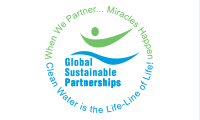FOR IMMEDIATE RELEASE
Thursday, October 1, 2015
U.S. Based Global Sustainable Partnerships Uses Community Innovation and Creative Technology to Bring Clean and Safe Drinking Water to Thousands in Tanzania
Organization Plans to Utilize “In-Country” Approach to Expand Programs on Preventive Health Care, Sanitation and Nutrition in Other Countries
(Washington) – Thousands of Tanzanians have access to clean and safe drinking water thanks to Global Sustainable Partnerships (GSP) and a grant from the Bristol-Myers Squibb Foundation.
“With the grant we were able to install 400 Hydraid® BioSand filters and safe, clean drinking water has become a reality for over 40,000 students, 200 households in 2 District’s, 57 government and faith based hospitals, as well as a regional hospital,” said Kimberly L. Fogg, Global Sustainable Partnerships Founder. “In addition, our in-country partner, Dr. Askwar Hilonga was awarded the Royal Academy of Engineering prize for his research on clean water technology and GSP donated the filters so he could conduct his research,” said Fogg.
The unique way in which GSP introduced filters into schools has been a major contributor to the success and sustainability of the program. Unlike other NGOs which provide the hardware components only, GSP sets up a community-based infrastructure. Its representatives go to the communities and work directly with the local governments, teachers, and district medical officers and consults the village elders. “Who best to provide behavior change initiatives than those people who live and work in the community?” said Fogg.
For the water project, Global Sustainable Partnerships has created a network of health trainers via teachers who bring the education back to their classrooms. This “train the trainer” approach allows both teachers and students to understand why filtered water is important to their health including hand washing and other critical hygiene safety initiatives. “Students play an important role in the actual construction of “their” BioSand filters (BSF) which builds a sense of pride, ownership, stewardship and accountability for the care and use of the filters,” said Fogg.
“After four years of testing, training, working in the schools and communities to see what does and does not work, and then taking proactive steps to improve conditions in Tanzania, we know we have developed an integrated engagement system that can make a significant difference to the lives of people,” said Fogg. “With partners such as the Bristol-Myers Squibb Foundation, our motto, “When We Partner, Miracles Happen” is truly a reality,” she added.
In addition to its successful clean water, health, hygiene and sanitation initiatives in Tanzania, now, the Silver Spring, Maryland- based nonprofit organization hopes to advance its community- based Integrated Health Model (IHM) to include Malaria control through the World’s only EPA# Skintex MRIII microencapsulated permethrin blankets and Shemaghs (e.g. scarfs that wrap around your neck) (that meets and or exceeds US Military and WHO International test standard is a specialty, one-of-a-kind personal protection delivery Pchikungunya, among other blood borne infections), and Menstrual Health Management (MHM) in other African countries. Our IHM initiatives will promote sustainable community development solutions that aides in empowering women to establish “green” jobs and sustainable locally owned businesses (e.g. selling filters, blankets and Shemaghs, reusable sanitary pads and soap). In addition, GSP has partnered with the Natacha Fund’s “Adopt a Hospital” program. )
Global Sustainable Partnerships (GSP) , Inc. was founded by Kimberly L. Fogg and co-founded by Mary Barth, who is from Tanzania. GSP is a 501(c)(3) certified by the Center for Affordable Water and Sanitation Technology (CAWST). The organization transfers knowledge and skills through training and education in the construction and maintenance of the Hydraid® BioSand filter and the overall education of health, sanitation and hygiene practices for children in primary and secondary schools and their families in developing countries.
For more information contact us at www.gspartnerships.org
Follow us on Facebook
